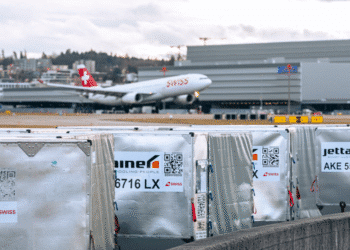Hughes calls for cooperation across supply chain

MIAMI – IATA’s global head of cargo, Glyn Hughes, said the logistics business is not keeping up with technology – a sentiment that’s been expressed before, but one he said cannot be emphasized enough. Hughes, who addressed attendees at today’s ACMG Workshop, which is part of the Cargo Facts Symposium (CFS) 2015, also called for more communication across the airfreight supply chain.
Hughes keyed in on the importance of and level of sophistication required in shipping high-value goods that must go by air, including include high-tech goods, perishables and pharmaceuticals. According to Hughes, a leading pharmaceutical company claims that “80 percent of their failed shipments were due to air cargo and a lack of knowledge by those who are handling it.”
To solve this problem, Hughes emphasized the necessity of increased attention on customer service and technology in the airfreight business. “Air cargo must transform itself into a lean, adaptive and innovative industry centered around increasingly sophisticated customer demands,” he said.
He continued by stating that it’s very important that relationships must remain positive between air carriers, forwarders and ground handlers. “Airlines and forwarders must not be adversarial,” he said. He also said air cargo needs more liberalized traffic rights. “Information should be shared on a community basis,” he said. “This is how the integrators work. Data sharing is critical.”
Air cargo comprises less than 1 percent of international trade by volume, Hughes said, yet it makes up 35 percent of the value of goods that are transported internationally because of the high-dollar value of the goods being shipped. When he commented that the world’s cutting-edge technologies are being shipped on a supply chain with some of the world’s least-sophisticated systems, the irony was not lost on the CFS audience.
The good news is e-commerce is exploding, and new innovations such as airships, 3D printing and drone vehicles are all in formative stages. Rather than being a threat to air cargo, 3D printing technology will be good for the industry, he said, because the components and actual printers will need to be shipped by air.




